Everyone has to know what and how to feed an animal before they start raising the animal. This is the same for people who raise guinea fowl. Guinea fowl are birds with an African origin, so getting the food they eat in the wild might be challenging for you. What can you feed guinea fowl with? What do they eat in the wild? Can you give your guinea fowl some tasty treats? Read this article.
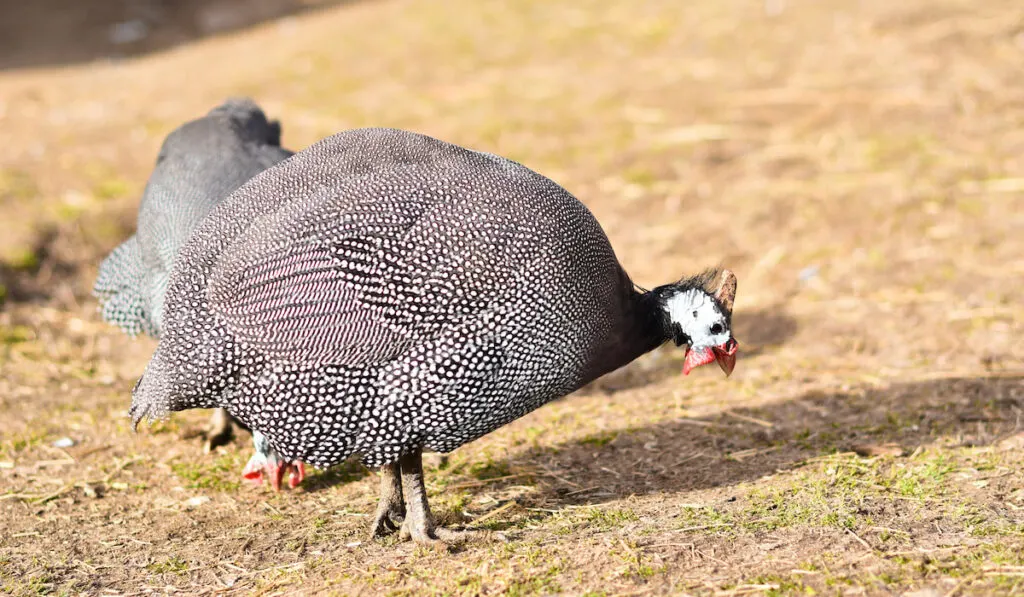
What do guinea fowl eat?
Guinea fowl, as omnivorous birds, eat a wide range of plant and animal products. Some examples of what guinea fowl eat are:
- Frogs
- Fruits
- Snails
- Insects
- Snakes
- Cereals
- Birdfeed
- Tasty treats
- Earthworms
- Weed seeds
What are examples of cereals, tasty treats, and fruits that you can give to your guinea fowl? When should you feed your guinea fowl? How much food do they need? Continue reading to find out the answer to all your questions and more.
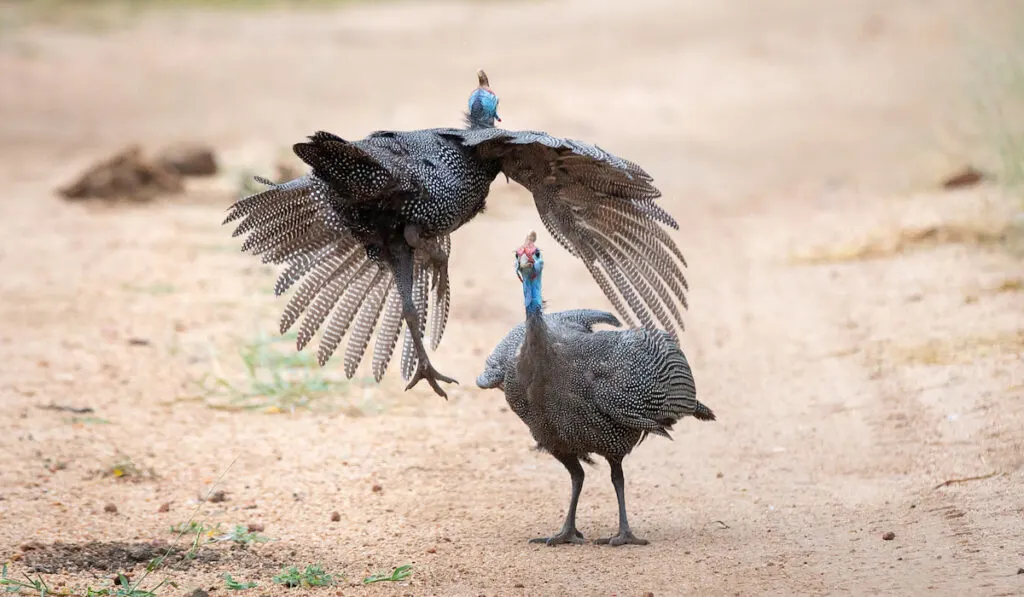
Table of Contents
Understanding the Nutrition of Guinea Fowl
To understand what an animal eats and what you should feed it, you have to know what the animal eats in the wild. Through studying an animal’s nutritional behavior in the wild, you will know what to feed them in captivity (or as pets).
Let us discuss what guinea fowl eats in the wild.
What Do Guinea Fowl Eat in the Wild?
Guinea fowl are birds that originate from Africa. The guinea fowl you intend to buy soon (or you already have) originated from the wild helmeted guinea fowl (Numida meleagris). Guinea fowl are found in the arid plains of Africa. As wild birds, guinea fowl are hardy and can eat a wide range of foods.
Guinea fowl are omnivorous birds. An omnivorous animal is any animal that eats both plants and animals (including their products). In Africa, guinea fowl forage for food and eat worms, snails, reptiles, insects, wild berries, seeds, etc.
What Can You Feed Your Guinea Fowl?
What you should feed your guinea fowl with depends on why you are raising the birds. Some uses of guinea fowl are:
- They are kept as pets
- They make great security beds
- They can be used for pest control
- They are raised for egg production
- They are raised for meat production
If you keep guinea fowl as pets, you can help them bond more with you by giving them treats regularly (asides their regular feed).
Note: Examples of tasty treats for guinea fowl will be given later.
If your yard is frequently disturbed by pests like rats, snakes, snails, etc. guinea fowl come in handy. Guinea fowl that are used for pest control are usually not fed during the day so that they will forage for their food (i.e. the pest).
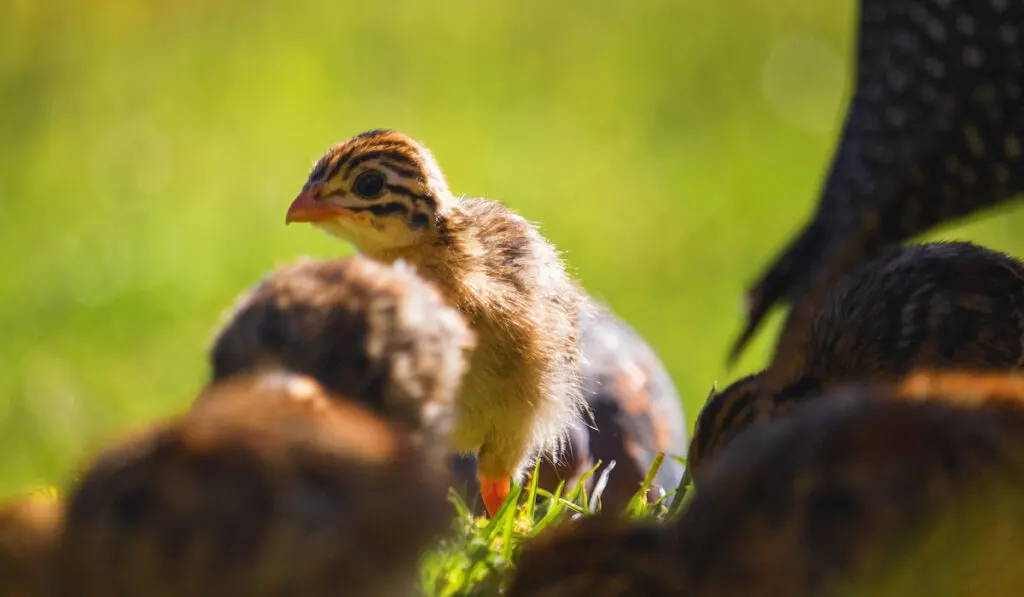
To encourage guinea fowl to return to their shelter or coop at night (or in the evening), you should occasionally reward them with tasty treats. During winter you should supplement your guinea fowls diet with regular chicken or game bird feed even if they normally live on pasture.
Where food might be plentiful in the spring, the supply will start to decrease in many areas as temperatures become cooler (remember that guinea fowl in the wild do not experience winter).
If you are raising guinea fowl for meat or egg production, you have to give them chicken, turkey, or wild bird feed to boost their protein consumption. According to the age of the bird, guinea fowl require 16-28% protein.
When guinea fowl are 0-5 weeks old (young guinea fowl are known as guinea keets), you should give them a starter feed with 24-28% protein. At 6-8 weeks of age, you can give them growers of 18-20% protein. When the birds are older than 5 weeks, you should feed them with a minimum of 16% protein. If you are raising them for meat, give them finisher feed. For egg production, give them layer mash.
Now that you know the basics of guinea fowl nutrition, let us discuss some examples of feed that you can give to your guinea fowl.
What Should You Feed Your Guinea Fowl With?
Don’t worry. Even though they originate from Africa, there is a lot of food in America (or wherever you are) that you can feed guinea fowl with. Some examples are:
1. Bird Feed
Guinea fowl accept processed bird feed. If a feed store around you do not have a guinea fowl-specific feed, you can feed your birds with chicken, turkey, or wild game bird feed.
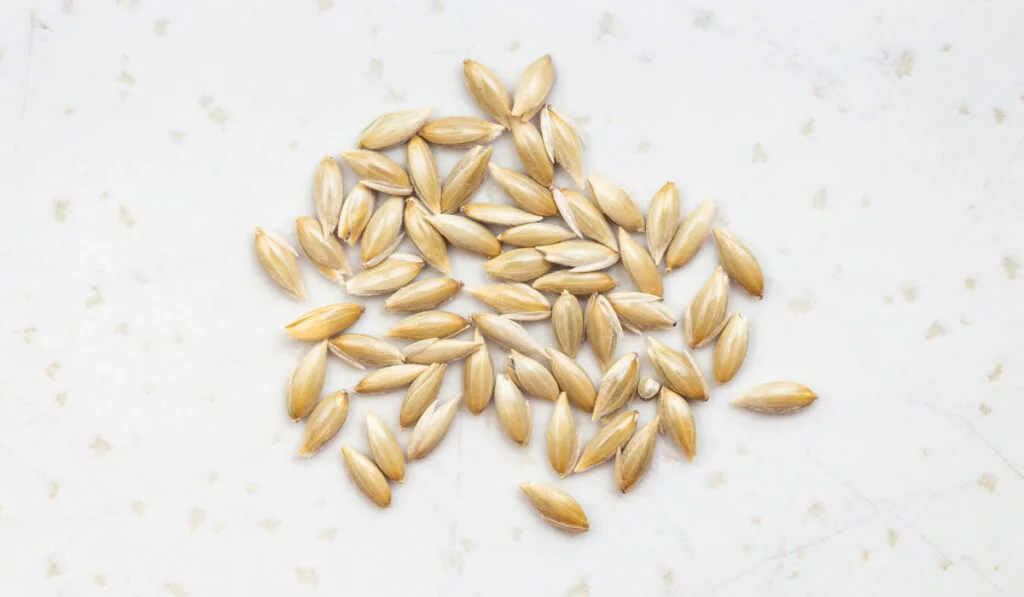
The processed feed is made with both plant and animal-sourced ingredients and has the required protein, calcium, carbohydrate, and other nutrient requirements.
For meat or egg production, you should feed your guinea fowl intensively using feed with the required protein content (check above). Free-range guinea fowl should be given extra feed in winter or any unfavorable season.
2. Cereals
Cereals!!! Cereals are guinea fowl favorite treats. Examples of cereals are:
- Oat
- Corn
- Millet
- Barley
- Sorghum
Experienced poultry keepers use cereals to train and reward guinea fowl to return to their shelter or coop. When your guinea keets are mature enough to leave their brooder, you can use cereals occasionally to reward them when they return to their shelter. Rewarding them with cereals encourages them to return.
In winter, you can give them cereals at night to keep warm (because digestion produces heat).
Even though cereals are very healthy for guinea fowl, you should not give them regularly so that they do not get used to it. The secret to training guinea fowl with cereals is to make them have value for cereals. If they get fed with cereals regularly, they will not value it so much anymore.
3. Special Feed
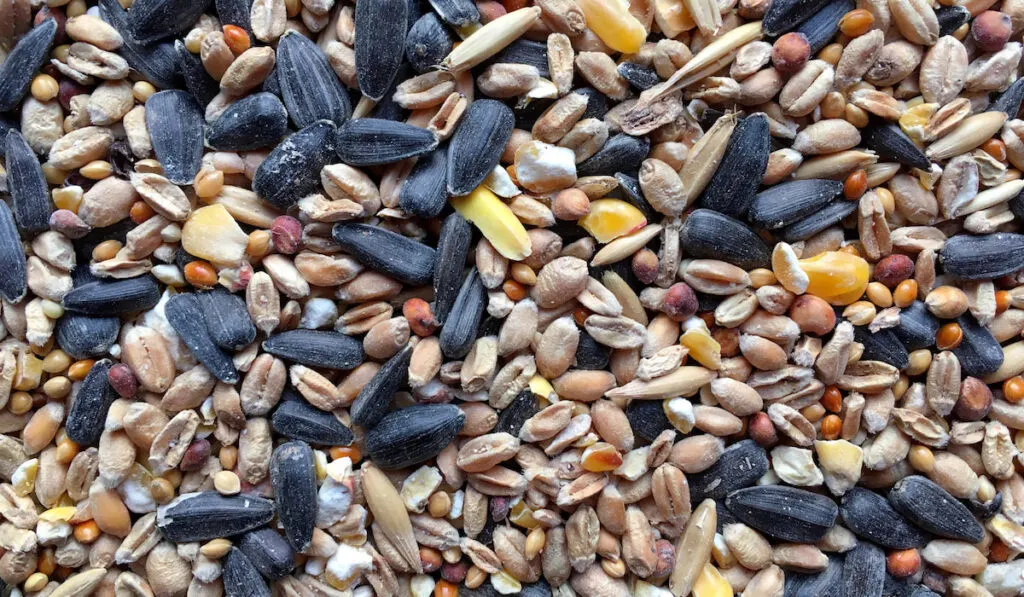
There are special kinds of feed that guinea fowl love. Some special feed for your birds are:
- Mealworms
- Mixed feeds
- Wild bird seeds
- Sunflower seeds
Mealworms are the larvae of the mealworm beetle (Tenebrio molitor). They are an excellent source of animal protein for your guinea fowl.
There are mixed feeds that contain a variety of ingredients for birds. Depending on the brand, mixed feeds can be a combination of:
- Millet
- rolled oats
- scratch mix
- feed pellets
- Mealworms
It does not matter the kind of feed that you want to buy, you can get them at a feed store, poultry shop, or order them online.
4. Common Human Foods
Why throw your consumable wastes away when guinea fowl can eat them? Guinea fowls can eat food wastes such as:
- Rice
- Beef
- Bread
- Chicken
- Vegetables
Next time you are emptying your dishes, remember that there are guinea fowl around.
5. Fruits and Vegetables
Just like chickens, guinea fowl love fruits and vegetables. Fruits and vegetables give guinea fowl vitamins and minerals. You can also use fruits and vegetables to keep guinea fowl active.
If you hang cabbage and other vegetables in the guinea fowl shelter or coop, your birds will happily peck on it. Hanged vegetables in bird coop are called “Green piñatas.”
We hope that you find the suggestions of what to feed your guinea fowl useful. Do you want to know some weird things that guinea fowl eat?
3 Odd Things Guineas Are Known to Eat
Guinea fowl still carry some wild characteristics. The items listed below are a few weird foods for guinea fowl.
1. Snakes and Other Reptiles
Do snakes invade your yard occasionally? Worry no more. If you have guinea fowl around, they will search for and eat pests in your yard. Make sure that you do not overfeed the guinea fowl so that they do not become too lazy to forage for food.
2. Mice and Rats
Just like reptiles, guinea fowls will search for mice, rats, and other rodents to eat. These birds are good when it comes to pest control.
3. Agricultural Pests
If you have a garden and your vegetables are disturbed by pests, you should have guinea fowl around. In terms of agricultural pest control, guinea fowl are more productive than chickens and ducks because chickens might scratch the ground and uproot your crops, the feet of ducks might crush young plants, but guinea fowl take only the pests.
Examples of agricultural pests are:
- Slugs
- Snails
- Aphids
- Beetles
- Spider mites
The best way to feed your guinea fowl is to allow them to forage for food. Free ranged guinea fowl are always happier than cooped guinea fowl.
Final Thoughts
Guinea fowl can eat a wide range of food. As omnivorous birds, they get nutrition from both plant and animal sources. You should give them cereals are special treats. If you can, allow your guinea fowls to forage for their food.
Source
- https://poultry.extension.org/articles/poultry-management/raising-guinea-fowl-in-small-and-backyard-flocks/
- https://guinea-fowl.com/guineas/Feeding-Guineas-what-they-eat.html
- https://www.backyardchickens.com/threads/what-can-i-give-my-guinea-fowl-for-treats.550668/
- https://www.thehappydaysfarm.com/treat-mix-for-our-guinea-fowl-chickens/
- https://poultrykeeper.com/general-guinea-fowl/beginners-guide-keeping-guinea-fowl/

Nanci Brown
Friday 2nd of September 2022
We had one we think female show up on our window sil and has stayed. Do we need to find a couple of others for her or what ?
Donald L Anderson
Wednesday 2nd of February 2022
Question can guinea fowl eat sweet potatoes?
Alice Hallberg
Tuesday 25th of May 2021
If I plant raspberry bushes, will the guinea fowl eat the raspberries?
Is it possible to have only female guinea fowl so the eggs will never be fertilize? I would just want eggs for eating and not for raising keets?
How many guinea fowl are needed for a small flock?
April Lee
Tuesday 25th of May 2021
When I first got Guineas I got two in a surprise box of chicks from the hatchery and they both wound up being female. They were happy and healthy with just the two of them though they did hang out with the chickens. Finding sexed guineas is likely going to be the hard part.
Guineas can eat raspberries and may browse on your bushes but they do prefer bugs, ticks, etc. I personally would just plant the bushes and then, if the guineas develop a taste for them, fence them off or deter them from the area. If they have a big enough space to roam it may never be an issue.
Gabriel
Wednesday 10th of March 2021
My guinea keets are dying every day, i dont know what type of food to give them. I'm in Namibia Nkurenkuru.
April Lee
Tuesday 25th of May 2021
They need a high protein food like bugs, meat, etc. Depending on how young they are they also need heat and shelter from wind/rain.